lesson 15 The damned human race
- 格式:ppt
- 大小:2.37 MB
- 文档页数:18
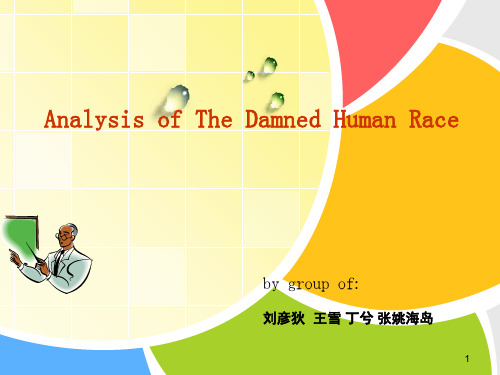
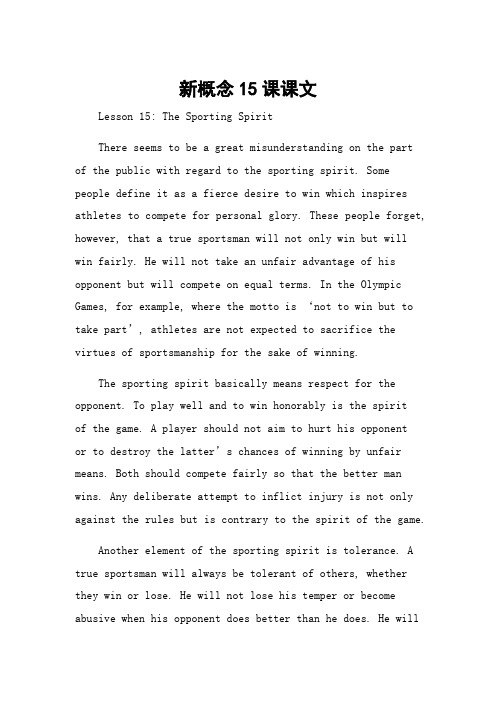
新概念15课课文Lesson 15: The Sporting SpiritThere seems to be a great misunderstanding on the partof the public with regard to the sporting spirit. Some people define it as a fierce desire to win which inspires athletes to compete for personal glory. These people forget, however, that a true sportsman will not only win but will win fairly. He will not take an unfair advantage of his opponent but will compete on equal terms. In the Olympic Games, for example, where the motto is ‘not to win but to take part’, athletes are not expected to sacrifice the virtues of sportsmanship for the sake of winning.The sporting spirit basically means respect for the opponent. To play well and to win honorably is the spiritof the game. A player should not aim to hurt his opponentor to destroy the latter’s chances of winning by unfair means. Both should compete fairly so that the better man wins. Any deliberate attempt to inflict injury is not only against the rules but is contrary to the spirit of the game.Another element of the sporting spirit is tolerance. A true sportsman will always be tolerant of others, whether they win or lose. He will not lose his temper or become abusive when his opponent does better than he does. He willaccept defeat gracefully and will not gloat over victory. The true sportsman plays for the sake of the game itself. For him, sport is not a battle but a means of self-expression.Winning and losing are both part of the game. A true sportsman realizes that every defeat is a challenge. He tries to learn from his defeats and better himself. Thus, the sporting spirit is essentially a spirit of humility. It recognizes that defeat is not necessarily a sign of weakness but an opportunity for progress.In the final analysis, it can be said that the sporting spirit is a way of life. It embodies the belief that the game must be played fairly and that the opponent must be respected. It demands self-control, tolerance, and generosity. A true sportsman is not only a winner but a gentleman as well.。

The Sad Young MenRod W。
Horton and Herbert W。
Edwards1 No aspect of life in the Twenties has been more commented upon and sensationally romanticized than the so—called Revolt of the Younger Generation。
The slightest mention of the decade brings nostalgic recollections to the middle-aged and curious questionings by the young: memories of the deliciously illicit thrill of the first visit to a speakeasy, of the brave denunciation of Puritan morality, and of the fashionable experimentations in amour in the parked sedan on a country road; questions about the naughty, jazzy parties, the flask—toting ”sheik,” and the moral and stylistic vagaries of the "flapper” and the ”drug-store cowboy。
" "Were young people really so wild?” present—day students ask their parents and teachers. ”Was there really a Younger Generation problem?" The answers to such inquiries must of necessity be "yes" and "no"—-”Yes" because the business of growing up is always accompanied by a Younger Generation Problem; ”no” because what see med so wild, irresponsible, and immoral in social behavior at the time can now be seen in perspective as being something considerably less sensational than the degenerauon of our jazzmad youth.2 Actually, the revolt of the young people was a logical outcome of conditions in the age: First of all, it must be remembered that the rebellion was not confined to the Unit— ed States, but affected the entire Western world as a result of the aftermath of the first serious war in a century。
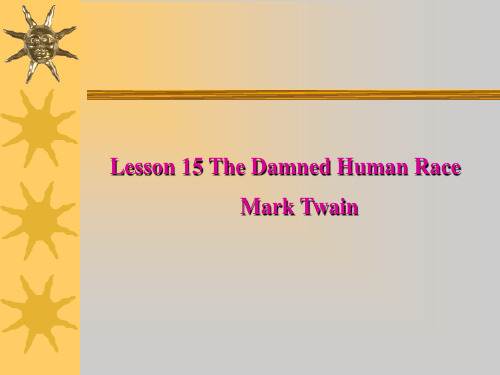
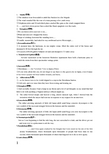
1.Simile(明喻)①The children went from adult to adult like buckets in a fire brigade② The wind sounded like the roar of a train passing a few yards away.③ Telephone poles and 20-inch-thick pines cracked like guns as the winds snapped them④ ……and blow-down power lines coiled like black spaghetti over the roads.2.Metaphor(暗喻)①We can batten down and ride it out…②Wind and rain now whipped the house.③Strips of clothing festooned the standing trees.....④Camille, meanwhile, had raked its way northward across Mississippi.....3.Personification(拟人)①A moment later, the hurricane, in one mighty swipe, lifted the entire roof of the house and skimmed it 40 feet through the air.② It seized a 600,00-gallon Gulfport oil tank and dumped it 3.5 miles away4. Transferred Epithet(移就)Several vacationers at the luxurious Richelieu Apartments there held a hurricane party to watch the storm from their spectacular vantage point.1.Sarcasm(讽刺)①Hiroshima-------the “Liveliest ”City in Japan.(Tibet)②If you write about this city, do not forget to say that it is the gayest city in Japan, even if many of the town’s people still bear hidden wounds, and burns.2.Alliteration(头韵)①…as the fastest train in the w orld slipped to a stop in the Hiroshima Station.② I felt sick, and ever since then they have been testing and treating me.3.Metaphor(暗喻)①And secondly, because I had a lump in my throat and a lot of sad thoughts on my mind that had little to do with anything a Nippon railways official might say.②The usher bowed deeply and heaved a long, almost musical sigh, when I showed him theinvitation which the mayor had sent me in response to my request for an interview.4.Synecdoche(提喻)The rather arresting spectacle of little old Japan adrift amid beige concrete skyscrapers is the very symbol of the incessant struggle between the kimono and the miniskirt.5.Metonymy(转喻)The rather arresting spectacle of little old Japan adrift amid beige con crete skyscrapers is the very symbol of the incessant struggle between the kimono and the miniskirt.6.Onomatopoeia(拟声)Just as I was beginning to find the ride long, the taxi screeched to a halt, and the driver got out and went over to a policeman to ask the way.7.Parallelism(排比)……and I was again crushed by the thought that I now stood on the site of the first atomic bombardment, where thousands upon thousands of people had been slain in one second, where thousands upon thousands of others had lingered on to die in slow agony.8.Anti-climax(渐降)Seldom has a city gained such world-renown, and I am proud and happy to welcome you to Hiroshima, a town known throughout the world for its------oysters.9.Climax(渐升)No one talks about it any more, and no one want to, especially, the people who were born here or who lived through it.10.Euphemism(委婉语)Everyday that I escape death, each day of suffering that helps to free me from earthly cares, I make a new little paper bird ,and e add it to the others.11.Rhetorical Question(修辞疑问句)Was I not at the scene of the crime?1.Sarcasm(讽刺)①Earlier she had dispatch her maid on an invented errand and, cruelly, instructed the moonfaced male secretary ---who was terrified of dogs---to exercise the Bedlington terriers②The house detective’s piggy eyes surveyed her sardonically from his gross jeweled face.1.Hyperbole(夸张)①The trail that rocked the world②Now i was involved in a trail reported the world over.2.Sarcasm(讽刺)①Bryan,ageing and paunchy,was assisted in his prosecution by his son②My friend the attorney general says that john scopes knows what he is here for③He did not say a cat was the same as a man?④There is some doubt about that⑤The Christian believes that man come from above.the evolutionist believes that man come from below.⑥Mr Byran,with passionate spirit and enthusiasm,has given most of his life to politics.⑦Bryan mopped his bald dome in science.3.Irony(反讽)…Until we are marching backwards to the glorious age of the sixteenth century4.Pun(双关)…DARWIN IS RIGHT INSIDE…5.Oxymoron(矛盾修饰法)①mrching backwards②victorious defeat6.Transferred Epithet(移就)… Darrow had whispered,throwing a reassuring arm round my shoulder7.Synecdoche(提喻)The case had erupted round my head not lon after.8.Antithesis(对照)The Christian believes that man come from above.the evolutionist believes that man come from below.9.Alliteration(头韵)Gone was the fierce fervor of the days when…1. Irony(反讽)①I award this championship only after laborious research and incessant prayer②It is as if some titanic and aberrant genius,uncompromisingly inimical to man,had devoted all the ingenuity of Hell to the making of them,③It is incredible that mere ignorance should have achieved such masterpieces of honor.2. Sarcasm(讽刺)①Obviously,if there were architects of professional sense or dignity in the region,they would have perfected a chalet to hug the hillsides…②They are incomparable in color,and they are incomparable in design.3.Ridicule(嘲讽)①When it has taken on the patina of the mills it is the color of the egg long past all hope of caring②…they made it perfect in their own sight by putting a completely impossible penthouse, painteda staring yellow,on top of it.4.Understatement(低调陈述)The country itself is not uncomely,despite the grime of the endless mills.5.Antonomasia(换称)Safe in a pullman,I have whirled through the gloomy.6.Antithetical Contrast(反衬对比)①Here Here was the very heart of industrial America, the center of its most lucrative and characteristic activity, the boast and pride of the richest and grandest nation ever see on the earth ---and there was a scene so dreadfully hideous, so intolerably bleak and forlorn that it reduced the whole aspiration of man to a macabre.②Here was wealth beyond computation, almost beyond imagination--and here were human habitations so abominable that they would have disgraced a race of alley cats.7. Hyperbole(夸张)①What I allude to is the unbroken and agonizing ugliness, the sheer revolting monstrousness, of every house in sight②From East Liberty to Greensburg, a distance of twenty-five miles, there was not one in sight from the train that did not insult and lacerate the eye.③But in Westmoreland they prefer that uremic yellow, and so they have the most loathsome towns and villages ever seen by mortal eye.④I have seen, I believe, all of the most unlovely towns of the world; they are all to be found in the United States⑤I t is as if some titanic and aberrant genius , uncompromisingly inimical to man, had devoted all the ingenuity of Hell to the making of them.8.Metaphor(暗喻)①Here was the very heart of industrial America,②...on their low sides they bury themselves swinishly in the mud③And one and all they are streaked in grime, with dead and eczematous patches of paint peeping through the streaks.④The effect is that of a fat woman with a black eye. It is that of a Presbyterian grinning⑤Out of the melting pot emerges a race which hates beauty as it hates truth.9. Simile(明喻)①…one blinks before a man with his face shot away②…a crazy little church just west of Jeannette, set like a dormer-window on the side of a bare leprous hill③…a steel stadium like a huge rattrap somewhere further down the line10. Rhetorical Question(修辞疑问句)①But what have they done?②Was it necessary to adopt that shocking color?③Are they so frightful because the valley is full of foreigners--dull, insensate brutes, with no love of beauty in them?④Then why didn't these foreigners set up similar abominations in the countries that they came from?1. Simile(明喻)①Most Americans remember Mark Twain as the father of Huck Finn’s idylliccruise through eternal boyhood and Tom Sawyer’s endless summer of freedom and adventure.②……together with the colorful language that he soaked up with a memory that seemed phonographic,2. Metaphor(暗喻)①Mark Twain-Mirror of America②……who saw clearly ahead a black wall of night.③…main artery of transportation in the young nation’s heart.④He went west by stagecoach and succumbed to the epidemic of gold and silver fever in Nevada’s Washoe region3. Sarcasm(讽刺)1)….I knew more about retreating than the man that invented retreating.2)…one could set a trap anywhere and catch a dozen abler men in a night.4. Alliteration(头韵)1)The cast of the characters set before him in his new profession was reach and varied----a cosmos.2)…for all the slow, sleepy, sluggish-brained sloth stayed at home…3) It was that population that gave to California a name for getting up astounding enterprisesand rushing them through with a magnificent dash and daring and a recklessness of cost or consequences…5.Antithesis(对照)1)…of the difference between what people claim to be and what they really are2)Casually he debunked revered artists and art treasures, and took unholy verbal shots at theHoly Land3) …a world which will lament them a day and forget them forever.6.Hyperbole(夸张)1) Most Americans remember Mark Twain as the father of Huck Finn’s idylliccruise through eternal boyhood and Tom Sawyer’s endless summer offreedom and adventure.2) America laughed with him.7. Metonymy(转喻)1)…but for making money, his pen would prove mightier than his pickax.2)Mark Twain honed and experimented with his new writing muscles…..8. Euphemism(委婉语)1)…he commented with a crushing sense of despair on men’s finalrelease from earthly struggles….1.Understatement (低调陈述)We were anchored in what used to be the most productive fishing site in all of central Asia, but asI looked out over the bow, the prospects of a good catch looked bleak2.Personification (拟人)①Where there should have been gentle blue-green waves lapping against the side of the ship, there was nothing but hot dry sand---as far as I could see in all directions.②Now it is disappearing because the water that used to feed it has been diverted in an illconsidered irrigation scheme to grow cotton in the desert.③…with the sun glaring at midnight through a hole in the sky…、… and a nuclear submarine hovered in the water below. After it crashed throu gh the ice, took on its new passengers, and resubmerged…3. Hyperbole (夸张)Like the population explosion, the scientific and technological revolution began to speed slowly during the 18th century.4.Metaphor (暗喻)1)…the tunnel he was digging through time.2) On some nights, in high northern latitudes, the sky itself offers another ghostly image that signals the loss of ecological balance now in progress.3) What should we feel toward these ghosts in the sky?4) …or the new constancy of public debate over what to do with growing mountains of waste.5. Metonymy ( 转喻)Two and a half years later I slept under the midnight sun at the other end ofour planet, in a small tent pitched on a twelve-foot-thick slab of ice floating inthe frigid Arctic Ocean.6. Analogy ( 类比)But one doesn’t have to travel around the world to witness humankind’s assault on the earth. 7.Irony ( 反讽)The new shoreline was almost forty kilometers across the sand from where the fishing fleet was now permanently docked. Meanwhile, in the nearby town of Muynak the people were still canning fish---brought not from the Aral Sea but shipped by rail through Siberia from the Pacific Ocean, more than a thousand miles away.8.Parallelism (排比)… but in the air above every country, above Anta rctica, above the North Pole and the Pacific Ocean --- all the way from the surface of the earth to the top of the sky.1. Alliteration ( 头韵)1)I see also the dull , drilled, docile, brutish masses of the Hun soldiery plodding on like aswarm of crawling locusts.2) …just as the cause of any Russian fighting for his hearth and home is the cause of free menand free peoples in every quarter of the globe.2. Repetition (重复)1)From this nothing will turn us ---nothing.2) The Russian danger is the refore our danger , and the danger of the United States…3)…just as the cause of any Russian fighting for his hearth and home is the cause of free menand free peoples in every quarter of the globe.1)We have but one aim and one sight, irrevocable purpose.2) We will never parley, we will never negotiate with Hitler or any of his gang.i3) … that process of destroying his enemies one by which he has so long thrived andprospered…3.Parallelism ( 排比)1)I see the Russian soldiers standing on the threshold of their native land .I see them guarding their homes where mothers and wives pary…I see the ten thousand villages of Russia where the means of existence is wrung so hardly from the soil…I see advancing upon all this in hideous onslaught the Nazi war machine…I see also the dull, drilled, docile, brutish masses of the Hun soldiery…I see the German bombers and fighters in the sky…2) Behind this entire glare, behind all this storm, I see that small group of villainous men whoplan, organize, and la unch this cataract of horrors upon mankind….3)We shall fight him by land , we shall fight him by sea ,we shall fight him in the air…4) That is our policy and that is our declaration.5) Let us learn the lessons…let us redouble our exention…4. Antithesis ( 对照)Any man or state who fights on against Nazidom will have our aid . Any man or state who marches with Hitler is our foe.5. Metaphor ( 暗喻)1)I see the Russian soldiers standing on the threshold of their native land …2) Behind all this glare, behind all this storm, I see that small group of villainous men who plan , organize, and launch this cataract of horrors upon mankind….6. Simile ( 明喻)… brutish masses of the Hun soldiery plodding on like a swarm of crawling locusts. 7.Paradox(悖论)It excels all forms of human wickedness in the efficiency of its cruelty and ferocious aggression.8.Hyperbole(夸张)If Hitler invaded Hell I would make at least a favorable reference to the Devil in the house of Commons9Rhetorical Question(修辞疑问句)….but can you doubt what our policy will be ?10periodic sentence(圆周句)1)Any man or state who fights on against Nazidom will have our aid. Any man or state who marches with Hitler is our foe.2)….if Hitler imagines that his attack on Soviet Russia will cause the sligh test divergence of aims or slackening of effort in the great democracies who are resolved upon his doom, he iswoefully mistaken.11.onomatopoeia (拟声)…with its clanking, heel-clicking, dandified Prussian officer…。
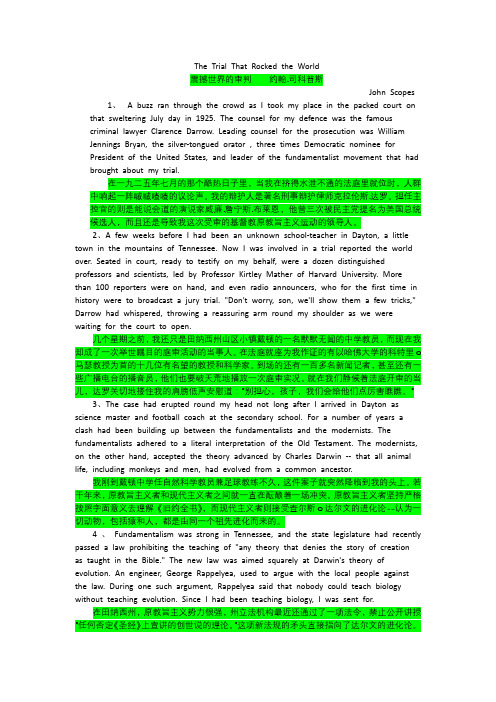
The Trial That Rocked the World震撼世界的审判约翰.司科普斯John Scopes1、A buzz ran through the crowd as I took my place in the packed court onthat sweltering July day in1925.The counsel for my defence was the famouscriminal lawyer Clarence Darrow.Leading counsel for the prosecution was William Jennings Bryan,the silver-tongued orator,three times Democratic nominee forPresident of the United States,and leader of the fundamentalist movement that had brought about my trial.在一九二五年七月的那个酷热日子里,当我在挤得水泄不通的法庭里就位时,人群中响起一阵嘁嘁喳喳的议论声。
我的辩护人是著名刑事辩护律师克拉伦斯.达罗。
担任主控官的则是能说会道的演说家威廉.詹宁斯.布莱恩,他曾三次被民主党提名为美国总统候选人,而且还是导致我这次受审的基督教原教旨主义运动的领导人。
2、A few weeks before I had been an unknown school-teacher in Dayton,a little town in the mountains of Tennessee.Now I was involved in a trial reported the world over.Seated in court,ready to testify on my behalf,were a dozen distinguished professors and scientists,led by Professor Kirtley Mather of Harvard University.More than100reporters were on hand,and even radio announcers,who for the first time in history were to broadcast a jury trial."Don't worry,son,we'll show them a few tricks," Darrow had whispered,throwing a reassuring arm round my shoulder as we were waiting for the court to open.几个星期之前,我还只是田纳西州山区小镇戴顿的一名默默无闻的中学教员,而现在我却成了一次举世瞩目的庭审活动的当事人。
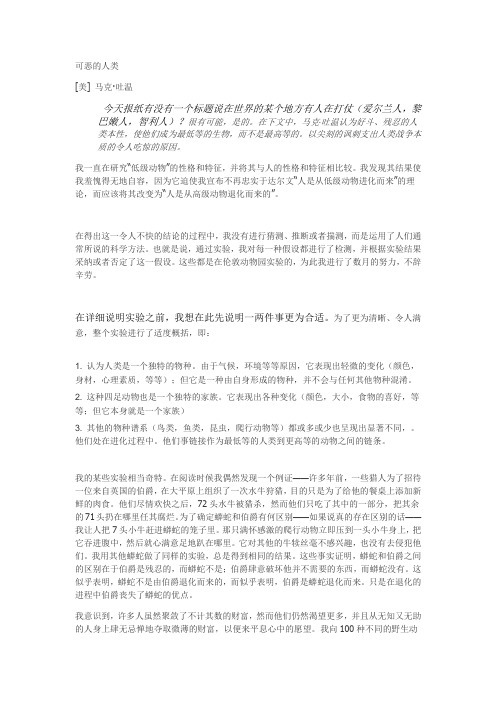
可恶的人类[美] 马克·吐温今天报纸有没有一个标题说在世界的某个地方有人在打仗(爱尔兰人,黎巴嫩人,智利人)?很有可能,是的。
在下文中,马克·吐温认为好斗、残忍的人类本性,使他们成为最低等的生物,而不是最高等的。
以尖刻的讽刺支出人类战争本质的令人吃惊的原因。
我一直在研究“低级动物”的性格和特征,并将其与人的性格和特征相比较。
我发现其结果使我羞愧得无地自容,因为它迫使我宣布不再忠实于达尔文“人是从低级动物进化而来”的理论,而应该将其改变为“人是从高级动物退化而来的”。
在得出这一令人不快的结论的过程中,我没有进行猜测、推断或者揣测,而是运用了人们通常所说的科学方法。
也就是说,通过实验,我对每一种假设都进行了检测,并根据实验结果采纳或者否定了这一假设。
这些都是在伦敦动物园实验的,为此我进行了数月的努力,不辞辛劳。
在详细说明实验之前,我想在此先说明一两件事更为合适。
为了更为清晰、令人满意,整个实验进行了适度概括,即:1. 认为人类是一个独特的物种。
由于气候,环境等等原因,它表现出轻微的变化(颜色,身材,心理素质,等等);但它是一种由自身形成的物种,并不会与任何其他物种混淆。
2. 这种四足动物也是一个独特的家族。
它表现出各种变化(颜色,大小,食物的喜好,等等;但它本身就是一个家族)3. 其他的物种谱系(鸟类,鱼类,昆虫,爬行动物等)都或多或少也呈现出显著不同,。
他们处在进化过程中。
他们事链接作为最低等的人类到更高等的动物之间的链条。
我的某些实验相当奇特。
在阅读时候我偶然发现一个例证——许多年前,一些猎人为了招待一位来自英国的伯爵,在大平原上组织了一次水牛狩猎,目的只是为了给他的餐桌上添加新鲜的肉食。
他们尽情欢快之后,72头水牛被猎杀,然而他们只吃了其中的一部分,把其余的71头扔在哪里任其腐烂。
为了确定蟒蛇和伯爵有何区别——如果说真的存在区别的话——我让人把7头小牛赶进蟒蛇的笼子里。
那只满怀感激的爬行动物立即压到一头小牛身上,把它吞进腹中,然后就心满意足地趴在哪里。

mordheim - city of the damned 中文-概述说明以及解释1.引言1.1 概述《Mordheim - City of the Damned》是一款基于Games Workshop的同名桌面游戏改编而成的策略角色扮演游戏。
该游戏以一座被毁灭性灾难笼罩的城市Mordheim为背景,玩家将扮演一支小队,在这座被诅咒的城市中寻找宝藏并与其他敌对势力展开激烈的战斗。
游戏融合了策略、战术、角色扮演和多人对战元素,给玩家带来极具挑战性和乐趣的游戏体验。
本文将深入探讨《Mordheim - City of the Damned》的历史背景、游戏玩法介绍以及游戏特色分析,旨在为读者提供全面了解和评价这款游戏的内容,并分享玩家们的游戏体验和展望该游戏的未来发展。
1.2 文章结构文章结构部分将主要分为三个部分,分别是引言、正文和结论。
在引言部分中,将对游戏《Mordheim - City of the Damned》进行概述,介绍文章的结构和目的。
在正文部分中,将详细探讨Mordheim的历史,介绍游戏的玩法和特色分析。
最后,在结论部分中,将对游戏进行评价,并分享玩家的体验,同时展望游戏的未来发展。
整篇文章将围绕这三个部分展开,从不同的角度来探讨Mordheim这款游戏的魅力和特点。
1.3 目的:本文的目的是对游戏《Mordheim - City of the Damned》进行全面的介绍和分析。
通过对游戏的历史背景、玩法介绍以及特色分析,帮助玩家更全面地了解这款游戏,从而对其进行更好的评价和选择。
同时,通过玩家体验分享和未来展望的部分,希望可以为那些对这款游戏感兴趣或已经在玩的玩家提供更多有价值的信息和视角,让他们更好地享受游戏的乐趣,同时也为游戏的未来发展提供一些建议和展望。
通过本文的撰写,旨在为广大玩家提供一些有益的参考和指导,促进游戏文化的传播和发展。
2.正文2.1 Mordheim的历史Mordheim的历史可以追溯到很久以前,这座城市曾是一个繁荣的商业中心和文化枢纽。
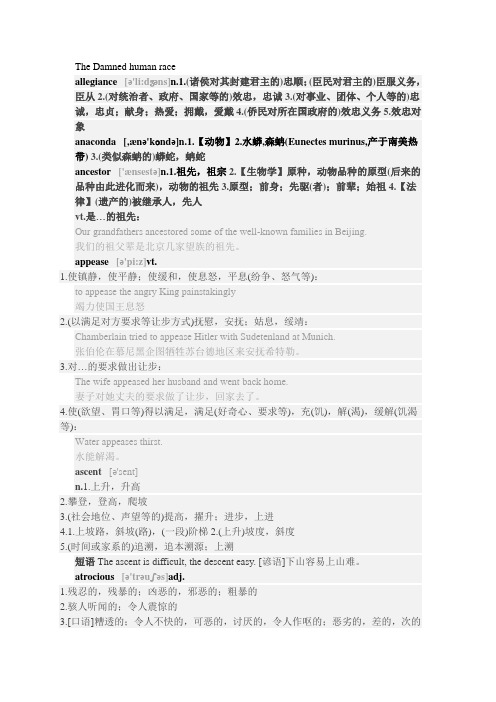
The Damned human raceallegiance [ə'li:dʒəns]n.1.(诸侯对其封建君主的)忠顺;(臣民对君主的)臣服义务,臣从2.(对统治者、政府、国家等的)效忠,忠诚3.(对事业、团体、个人等的)忠诚,忠贞;献身;热爱;拥戴,爱戴4.(侨民对所在国政府的)效忠义务5.效忠对象anaconda [,ænə'kɔndə]n.1.【动物】2.水蟒,森蚺(Eunectes murinus,产于南美热带) 3.(类似森蚺的)蟒蛇,蚺蛇ancestor ['ænsestə]n.1.祖先,祖宗2.【生物学】原种,动物品种的原型(后来的品种由此进化而来),动物的祖先3.原型;前身;先驱(者);前辈;始祖4.【法律】(遗产的)被继承人,先人vt.是…的祖先:Our grandfathers ancestored some of the well-known families in Beijing.我们的祖父辈是北京几家望族的祖先。
appease [ə'pi:z]vt.1.使镇静,使平静;使缓和,使息怒,平息(纷争、怒气等):to appease the angry King painstakingly竭力使国王息怒2.(以满足对方要求等让步方式)抚慰,安抚;姑息,绥靖:Chamberlain tried to appease Hitler with Sudetenland at Munich.张伯伦在慕尼黑企图牺牲苏台德地区来安抚希特勒。
3.对…的要求做出让步:The wife appeased her husband and went back home.妻子对她丈夫的要求做了让步,回家去了。
4.使(欲望、胃口等)得以满足,满足(好奇心、要求等),充(饥),解(渴),缓解(饥渴等):Water appeases thirst.水能解渴。
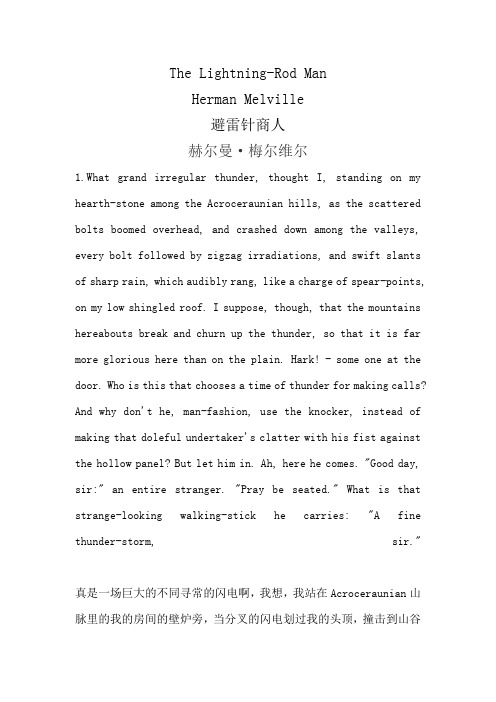
The Lightning-Rod ManHerman Melville避雷针商人赫尔曼·梅尔维尔1.What grand irregular thunder, thought I, standing on my hearth-stone among the Acroceraunian hills, as the scattered bolts boomed overhead, and crashed down among the valleys, every bolt followed by zigzag irradiations, and swift slants of sharp rain, which audibly rang, like a charge of spear-points, on my low shingled roof. I suppose, though, that the mountains hereabouts break and churn up the thunder, so that it is far more glorious here than on the plain. Hark! - some one at the door. Who is this that chooses a time of thunder for making calls? And why don't he, man-fashion, use the knocker, instead of making that doleful undertaker's clatter with his fist against the hollow panel? But let him in. Ah, here he comes. "Good day, sir:" an entire stranger. "Pray be seated." What is that strange-looking walking-stick he carries: "A fine thunder-storm, sir."真是一场巨大的不同寻常的闪电啊,我想,我站在Acroceraunian山脉里的我的房间的壁炉旁,当分叉的闪电划过我的头顶,撞击到山谷深处,每一道闪电都伴随着之字形的放射并且伴随着急雨,声音很大,就像是矛头的冲锋,撞到我的低矮的木瓦房顶。
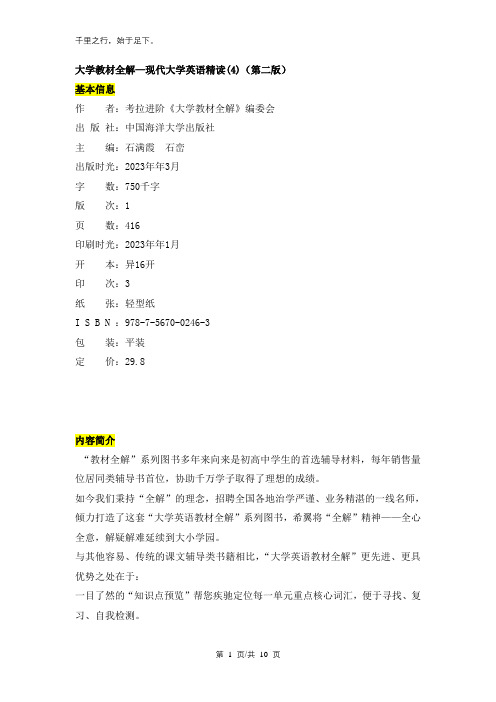
大学教材全解—现代大学英语精读(4)(第二版)基本信息作者:考拉进阶《大学教材全解》编委会出版社:中国海洋大学出版社主编:石满霞石峦出版时光:2023年年3月字数:750千字版次:1页数:416印刷时光:2023年年1月开本:异16开印次:3纸张:轻型纸I S B N :978-7-5670-0246-3包装:平装定价:29.8内容简介“教材全解”系列图书多年来向来是初高中学生的首选辅导材料,每年销售量位居同类辅导书首位,协助千万学子取得了理想的成绩。
如今我们秉持“全解”的理念,招聘全国各地治学严谨、业务精湛的一线名师,倾力打造了这套“大学英语教材全解”系列图书,希翼将“全解”精神——全心全意,解疑解难延续到大小学园。
与其他容易、传统的课文辅导类书籍相比,“大学英语教材全解”更先进、更具优势之处在于:一目了然的“知识点预览”帮您疾驰定位每一单元重点核心词汇,便于寻找、复习、自我检测。
第1 页/共10 页全晰透彻的“教材内容全解”编排清晰明了,按照课文天然顺序逐词逐句讲解,逼真模拟课堂教学,明确重点难点,为读者提供课前预习、课上学习、课后复习的全程辅导,助您一臂之力。
多维立体的“考拉进阶异常1+1记忆法”与课文篇章精析完美结合;每个核心必考词都从【记】【考】【串】【辨】【警】【源】【真题再现】几个方面出发,全方位构建记忆大厦,协助读者对词汇举行多层次、多角度的理解。
本书主要大栏目的设置理念为:文化背景衔接:文化,开阔视野。
该栏目为课文中涉及的重要人物、习俗、历史事件、科学技术等提供背景资料,图文并茂,为您打开瞭望西方文化的窗口。
教材内容全解:全解教材,面面俱到。
全面网罗每单元的所有栏目,两篇精读课文中涉及的所有重点难点都用最精炼的语言收拾、分析、解答、点拨。
语法要点归纳:归纳语法,搜索密钥。
本栏目紧扣每单元语法要点,以最精炼的语言,最地道的例句,解除最让人头疼的难题。
专四真题演练:牵手真题,能力跨越。
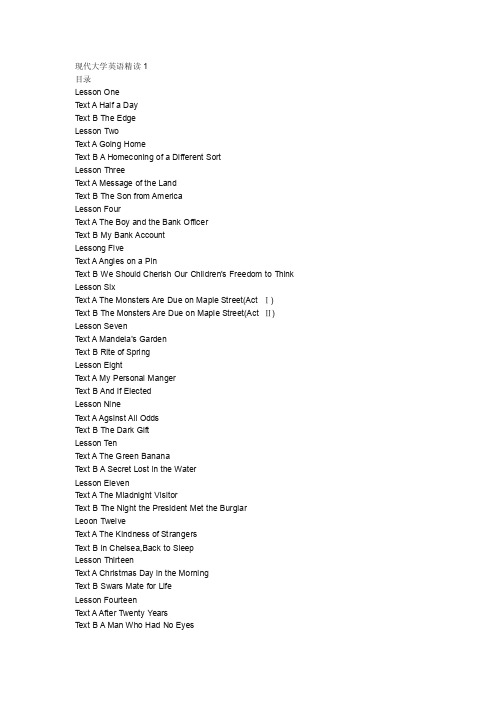
现代大学英语精读1目录Lesson OneT ext A Half a DayT ext B The EdgeLesson TwoT ext A Going HomeT ext B A Homeconing of a Different SortLesson ThreeT ext A Message of the LandT ext B The Son from AmericaLesson FourT ext A The Boy and the Bank OfficerT ext B My Bank AccountLessong FiveT ext A Angles on a PinT ext B We Should Cherish Our Children's Freedom to Think Lesson SixT ext A The Monsters Are Due on Maple Street(Act Ⅰ)T ext B The Monsters Are Due on Maple Street(Act Ⅱ) Lesson SevenT ext A Mandela's GardenT ext B Rite of SpringLesson EightT ext A My Personal MangerT ext B And If ElectedLesson NineT ext A Agsinst All OddsT ext B The Dark GiftLesson TenT ext A The Green BananaT ext B A Secret Lost in the WaterLesson ElevenT ext A The Miadnight VisitorT ext B The Night the President Met the BurglarLeoon TwelveT ext A The Kindness of StrangersT ext B In Chelsea,Back to SleepLesson ThirteenT ext A Christmas Day in the MorningT ext B Swars Mate for LifeLesson FourteenT ext A After Twenty YearsT ext B A Man Who Had No EyesLesson FifteenT ext A T ouched by the MoonT ext B A Plea for Our Planet~~~~~~~~~~~~~~~~~~~~~~~~~~~~~~~~~~~~~~~~~~~~~~~~~~~~~ 现代大学英语精读2目录Lesson One Another School Year-What For?Lesson Two Mahegun My BrotherLesson Three More Crime and Less PunishmentLesson Four The Nightingale and the RoseLesson Six The Man in The WaterLesson Seven The Greatest InventionLesson Eight Paychologically SpeakingLesson Ten The Richer,the PoorerLesson Eleven You Have to Get Me Out of HereLesson Twelve Confessions of a Miseducated ManLesson Fourteen Space Shuttle ChallengerLesson Fifteen The Riddle of Time~~~~~~~~~~~~~~~~~~~~~~~~~~~~~~~~~~~~~~~~~~~~~~~~~~~~~ 现代大学英语精读3目录Plan of the BookAcknowledgementT extsLesson OneT ext A Your College YearsT ext B Preparing for CollegeLesson TwoT ext A Discovery of a FatherT ext B The Last Word Was LoveLesson ThreeT ext A Michael Dell’s Two-Billion-Dollar DreamT ext B Would You Know a Computer If You Met One?Lesson FourT ext A Wisdom of Bear WoodT ext B Baby BirdsLesson FiveT ext A Twelve Angry Men (Part One)T ext B Shot Actress — Full Story (Part I)Lesson SixT ext A Twelve Angry Men (Part T wo)T ext B Shot Actress — Full Story (Part I)Lesson SevenT ext A The RivalsT ext B The Open WindowLesson EightT ext A "We’re Only Human"T ext B Button, ButtonLesson NineT ext A A Dill PickleT ext B The Valentine GenerationLesson TenT ext A Diogenes and AlexanderT ext B A Horseman in the SkyLesson ElevenT ext A Silent SpringT ext B Of Man and the Stream of TimeLesson TwelveT ext A The Needs that Drive Us AllT ext B Maslow’s Hierarchy of NeedsLesson ThirteenT ext A In My DayT ext B My Grandmother, the Bag LadyLesson FourteenT ext A Mercy at AppomattoxT ext B Grant and Lee: A Study in ContrastsLesson FifteenT ext A The President as Corporate SalesmanT ext B Our Leaders Don’t Know BestVocabulary ListIdiomatic Expressions and Collocations~~~~~~~~~~~~~~~~~~~~~~~~~~~~~~~~~~~~~~~~~~~~~~~~~~~~~ 现代大学英语精读4目录Plan of the BookAcknowledgementT extLesson OneT ext A Thinking as a HobbyT ext B The Pleasures of LearningLesson TwoT ext A Waiting for the PoliceT ext B The Hitch—hikerLesson ThreeT ext A Why Historians DisagreeT ext B The Third ManLesson FourT ext A A Drink in the PassageT ext B The BenchLesson FiveT ext A Man of the MomentT ext B Climbing the Mountain of SuccessLesson SixT ext A Groundless BeliefsT ext B Corn——pone OpinionsLesson SevenT ext A Spring SowingT ext B The Earth POetLesson EightT ext A Globalization’S Dual PowerT ext B The International Language of GesturesLesson Nine。
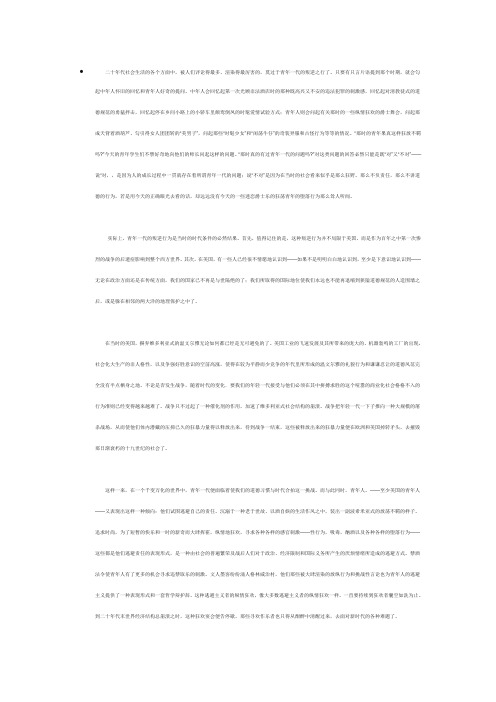
•二十年代社会生活的各个方面中,被人们评论得最多、渲染得最厉害的,莫过于青年一代的叛逆之行了。
只要有只言片语提到那个时期,就会勾起中年人怀旧的回忆和青年人好奇的提问。
中年人会回忆起第一次光顾非法酒店时的那种既高兴又不安的违法犯罪的刺激感,回忆起对清教徒式的道德规范的勇猛抨击,回忆起停在乡间小路上的小轿车里颠鸾倒凤的时髦爱情试验方式;青年人则会问起有关那时的一些纵情狂欢的爵士舞会,问起那成天背着酒葫芦、勾引得女人团团转的“美男子”,问起那些“时髦少女”和“闲荡牛仔”的奇装异服和古怪行为等等的情况。
“那时的青年果真这样狂放不羁吗?”今天的青年学生们不禁好奇地向他们的师长问起这样的问题。
“那时真的有过青年一代的问题吗?”对这类问题的回答必然只能是既“对”又“不对”——说“对,,是因为人的成长过程中一贯就存在着所谓青年一代的问题;说“不对”是因为在当时的社会看来似乎是那么狂野。
那么不负责任,那么不讲道德的行为,若是用今天的正确眼光去看的话,却远远没有今天的一些迷恋爵士乐的狂荡青年的堕落行为那么耸人听闻。
实际上,青年一代的叛逆行为是当时的时代条件的必然结果。
首先,值得记住的是,这种叛逆行为并不局限于美国,而是作为百年之中第一次惨烈的战争的后遗症影响到整个西方世界。
其次,在美国,有一些人已经很不情愿地认识到——如果不是明明白白地认识到,至少是下意识地认识到——无论在政治方面还是在传统方面,我们的国家已不再是与世隔绝的了;我们所取得的国际地位使我们永远也不能再退缩到狭隘道德规范的人造围墙之后,或是躲在相邻的两大洋的地理保护之中了。
在当时的美国,摒弃维多利亚式的温文尔雅无论如何都已经是无可避免的了。
美国工业的飞速发展及其所带来的庞大的、机器轰鸣的工厂的出现,社会化大生产的非人格性,以及争强好胜意识的空前高涨,使得在较为平静而少竞争的年代里所形成的温文尔雅的礼貌行为和谦谦忍让的道德风范完全没有半点栖身之地。
不论是否发生战争,随着时代的变化.要我们的年轻一代接受与他们必须在其中拼搏求胜的这个喧嚣的商业化社会格格不入的行为准则已经变得越来越难了。
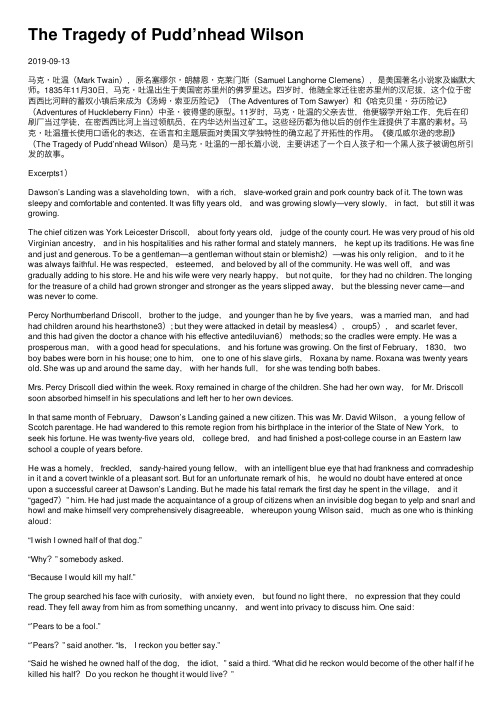
The Tragedy of Pudd’nhead Wilson2019-09-13马克·吐温(Mark Twain),原名塞缪尔·朗赫恩·克莱门斯(Samuel Langhorne Clemens),是美国著名⼩说家及幽默⼤师。
1835年11⽉30⽇,马克·吐温出⽣于美国密苏⾥州的佛罗⾥达。
四岁时,他随全家迁往密苏⾥州的汉尼拔,这个位于密西西⽐河畔的蓄奴⼩镇后来成为《汤姆·索亚历险记》(The Adventures of Tom Sawyer)和《哈克贝⾥·芬历险记》(Adventures of Huckleberry Finn)中圣·彼得堡的原型。
11岁时,马克·吐温的⽗亲去世,他便辍学开始⼯作,先后在印刷⼚当过学徒,在密西西⽐河上当过领航员,在内华达州当过矿⼯。
这些经历都为他以后的创作⽣涯提供了丰富的素材。
马克·吐温擅长使⽤⼝语化的表达,在语⾔和主题层⾯对美国⽂学独特性的确⽴起了开拓性的作⽤。
《傻⽠威尔逊的悲剧》(The Tragedy of Pudd’nhead Wilson)是马克·吐温的⼀部长篇⼩说,主要讲述了⼀个⽩⼈孩⼦和⼀个⿊⼈孩⼦被调包所引发的故事。
Excerpts1)Dawson’s Landing was a slaveholding town, with a rich, slave-worked grain and pork country back of it. The town was sleepy and comfortable and contented. It was fifty years old, and was growing slowly―very slowly, in fact, but still it was growing.The chief citizen was York Leicester Driscoll, about forty years old, judge of the county court. He was very proud of his old Virginian ancestry, and in his hospitalities and his rather formal and stately manners, he kept up its traditions. He was fine and just and generous. To be a gentleman―a gentleman without stain or blemish2)―was his only religion, and to it he was always faithful. He was respected, esteemed, and beloved by all of the community. He was well off, and was gradually adding to his store. He and his wife were very nearly happy, but not quite, for they had no children. The longing for the treasure of a child had grown stronger and stronger as the years slipped away, but the blessing never came―and was never to come.Percy Northumberland Driscoll, brother to the judge, and younger than he by five years, was a married man, and had had children around his hearthstone3); but they were attacked in detail by measles4), croup5), and scarlet fever,and this had given the doctor a chance with his effective antediluvian6) methods; so the cradles were empty. He was a prosperous man, with a good head for speculations, and his fortune was growing. On the first of February, 1830, two boy babes were born in his house; one to him, one to one of his slave girls, Roxana by name. Roxana was twenty years old. She was up and around the same day, with her hands full, for she was tending both babes.Mrs. Percy Driscoll died within the week. Roxy remained in charge of the children. She had her own way, for Mr. Driscoll soon absorbed himself in his speculations and left her to her own devices.In that same month of February, Dawson’s Landing gained a new citizen. This was Mr. David Wilson, a young fellow of Scotch parentage. He had wandered to this remote region from his birthplace in the interior of the State of New York, to seek his fortune. He was twenty-five years old, college bred, and had finished a post-college course in an Eastern law school a couple of years before.He was a homely, freckled, sandy-haired young fellow, with an intelligent blue eye that had frankness and comradeship in it and a covert twinkle of a pleasant sort. But for an unfortunate remark of his, he would no doubt have entered at once upon a successful career at Dawson’s Landing. But he made his fatal remark the first day he spent in the village, and it “gaged7)” him. He had just made the acquaintance of a group of citizens when an invisible dog began to yelp and snarl and howl and make himself very comprehensively disagreeable, whereupon young Wilson said, much as one who is thinking aloud:“I wish I owned half of that dog.”“Why?” somebody asked.“Because I would kill my half.”The group searched his face with curiosity, with anxiety even, but found no light there, no expression that they could read. They fell away from him as from something uncanny, and went into privacy to discuss him. One said:“’Pears to be a fool.”“’Pears?” said another. “Is, I reckon you better say.”“Said he wished he owned half of the dog, the idiot,” said a third. “What did he reckon would become of the other half if he killed his half? Do you reckon he thought it would live?”“Why, he must have thought it, unless he is the downrightest fool in the world; because if he hadn’t thought it, he would have wanted to own the whole dog, knowing that if he killed his half and the other half died, he would be responsible for that half just the same as if he had killed that half instead of his own. Don’t it look that way to you, gents?”“Yes, it does. If he owned one half of the general dog, it would be so; if he owned one end of the dog and another person owned the other end, it would be so, just the same; particularly in the first case, because if you kill one half of a general dog, there ain’t any man that can tell whose half it was; but if he owned one end of the dog, maybe he could kill his end of it and―”“No, he couldn’t either; he couldn’t and not be responsible if the other end died, which it would. In my opinion that man ain’t in his right mind.”“In my opinion he hain’t got any mind.”No. 3 said: “Well, he’s a lummox8), anyway.”“That’s what he is;” said No. 4. “He’s a labrick9)―just a Simon-pure10) labrick, if there was one.”“Yes, sir, he’s a dam11) fool. That’s the way I put him up,” said No. 5. “Anybody can think different that wants to, but those are my sentiments.”“I’m with you, gentlemen,” said No. 6. “Perfect jackass―yes, and it ain’t going too far to say he is a pudd’nhead. If he ain’t a pudd’nhead, I ain’t no judge, that’s all.”Mr. Wilson stood elected. The incident was told all over the town, and gravely discussed by everybody. Within a week he had lost his first name; Pudd’nhead took its place. In time he came to be liked, and well liked too; but by that time the nickname had got well stuck on, and it stayed. That first day’s verdict made him a fool, and he was not able to get it set aside, or even modified. The nickname soon ceased to carry any harsh or unfriendly feeling with it, but it held its place,and was to continue to hold its place for twenty long years.1. 英⽂节选部分选⾃⼩说的第⼀节,主要描述了威尔逊初到道森码头⼩镇时的情景,并交代了其“傻⽠”绰号的由来。
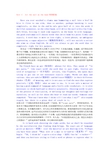
Unit 1 hit the nail on the head 恰到好处Have you ever watched a clumsy man hammering a nail into a box? He hits it first to one side, then to another, perhaps knocking it over completely, so that in the end he only gets half of it into the wood. A skillful carpenter, on the other hand, will drive the nail with a few firm, deft blows, hitting it each time squarely on the head. So with language; the good craftsman will choose words that drive home his point firmly and exactly. A word that is more or less right, a loose phrase, an ambiguous expression, a vague adjective(模糊的形容词), will not satisfy a writer who aims at clean English. He will try always to get the word that is completely right for his purpose.你见过一个笨手笨脚的男人往箱子上钉钉子吗?只见他左敲敲,右敲敲,说不准还会将整个钉子锤翻,结果敲来敲去到头来只敲进了半截。
而娴熟的木匠就不这么干。
他每敲一下都会坚实巧妙地正对着钉头落下去,一钉到底。
语言也是如此。
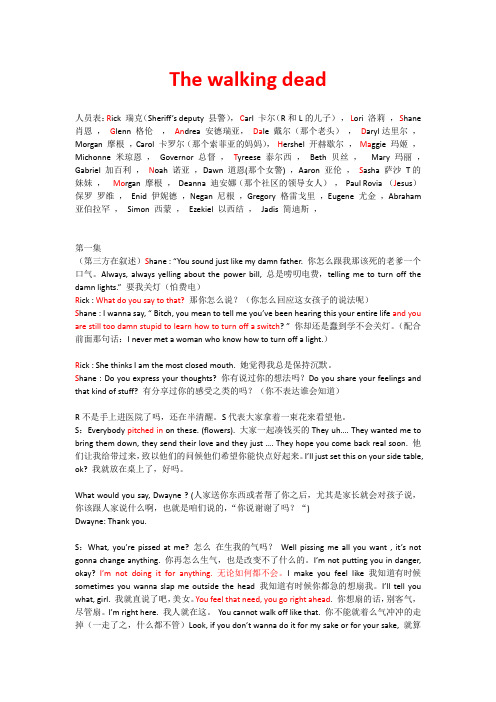
The walking dead人员表:R ick 瑞克(Sheriff’s deputy 县警),C arl 卡尔(R和L的儿子),L ori 洛莉,S hane 肖恩,G lenn 格伦,An drea 安德瑞亚,Da le 戴尔(那个老头),D aryl达里尔,Morgan 摩根,Carol 卡罗尔(那个索菲亚的妈妈),H ershel 开赫歇尔,Ma ggie 玛姬,Michonne 米琼恩,Governor 总督,T yreese 泰尔西,Beth 贝丝,Mary 玛丽,Gabriel 加百利,N oah 诺亚,Dawn 道恩(那个女警) ,Aaron 亚伦,S asha 萨沙T的妹妹,Mo rgan 摩根,Deanna 迪安娜(那个社区的领导女人),Paul Rovia (J esus)保罗罗维,Enid 伊妮德,Negan 尼根,Gregory 格雷戈里,Eugene 尤金,Abraham 亚伯拉罕,Simon 西蒙,Ezekiel 以西结,Jadis 简迪斯,第一集(第三方在叙述)S hane : “You sound just like my damn father. 你怎么跟我那该死的老爹一个口气。
Always, always yelling about the power bill, 总是唠叨电费,telling me to turn off the damn lights.”要我关灯(怕费电)R ick : What do you say to that?那你怎么说?(你怎么回应这女孩子的说法呢)S hane : I wanna say, “ Bitch, you mean to tell me you’ve been hearing this your entire life and you are still too damn stupid to learn how to turn off a switch? ”你却还是蠢到学不会关灯。

Unit 9一、授课时间:第15--16周二.授课类型:课文分析8课时;习题讲解4课时三.授课题目:The Damned Human Race四.授课时数:12五.教学目的和要求:通过讲授课文使大学生了解有关马克吐温幽默讽刺的写作风格,学会用英语解释句子以达到学以致用的目的。
要求学生主动地预习课文,课前准备练习,学会分析文章体裁和进行段落划分。
六.教学重点和难点:1)背景知识的传授:About the author;2)文章的体裁分析及段落划分;3)语言点的理解:Word study: allegiance; ascent; atrocious; avaricious; brood; conjecture; degenerate; descent; disposition; exterminate; gory; mutilation; oblige; rabid; scruple; wantonly Grammar Focus: Study and learn how such contrast expressions as and, but, compared to/with, while, unlike, and on the other hand, are used.七.教学基本内容和纲要Part One Warm – up1.1 Warm-up Questions1.2 Define the following words and phrasesPart Two Background Information2.1 Have you read much of Mark Twain? Can you name some stories, novels or essays he wrote? How do you like him? What qualities in his writings brought him world renown? Is this essay written in his usual humorous vein?Part Three Text Appreciation3.1 Text Analysis3.1.1 Theme of the text3.1.2 Structure of the text3.2 Writing Devices3.2.1 Contrast3.2.2 Humorous3.2.3 Satire and Parallelism3.3 Sentence ParaphrasePart Four Language Study4.1 Phrases and Expressions4.1.1 Word list:4.1.2 Phrases and expressions list:4.1.3 Word Building4.2 Grammar4.2.1 ObjectPart Five Extension5.1 Group discussion八、教学方法和措施本单元将运用黑板、粉笔、多媒体网络辅助教学设备等教学手段,主要采用以学生为主体、教师为主导的任务型、合作型等教学模式,具体运用教师讲授法、师生讨论、生生讨论等方法进行教学。
![[文学]the trial that rocked the world](https://img.taocdn.com/s1/m/1abdcc8770fe910ef12d2af90242a8956becaa8a.png)